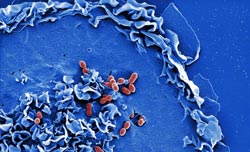Focus on the innate immune response

Dendretic cells with bacteria of the genus streptococcus<br>
The innate immune response to bacterial, viral and parasitic infections is the main topic of this year's “North-Regio-Day on Infection” meeting, short NoRDI IV. The symposium, entitled “Innate Immunity of Infections”, takes place on 24 October at the Helmholtz Centre for Infection Research (HZI) in Braunschweig.
For the fourth time, scientists come together to exchange research results and recent technical developments as well as to discuss important questions and future tasks in different fields of infection biology. The highlight of the symposium will be the Jürgen Wehland Award ceremony.
How exactly does the innate immune system respond to infections? How does it behave during the course of a disease and how does it learn to differentiate between “useful” and “hazardous” substances? These questions have been addressed by researchers for years now. “We need to understand how the immune response works to win the fight against infectious diseases,” says Prof Melanie Brinkmann, head of the junior research group “Viral Immune Modulation“ at the HZI.
„The NoRDI meeting is of special interest for young researchers as they get the unique opportunity to discuss current research results and questions with leading scientists in this area”, Brinkmann adds. Since the first conference in 2010 NoRDI has established itself as the main meeting point for infection researchers in northern Germany. Furthermore, it has long since evolved to an internationally renowned event that attracts the attention of scientists from all over the world.
Embedded in the scientific programme is the Jürgen Wehland Award ceremony for young scientists in infection research. The award will be presented for the third time in honourable remembrance of the former Scientific Director of the HZI.
Due to its international reputation the conference provides the ideal stage for the appointment of a new “Helmholtz International Fellow” as well. With this prize, the Helmholtz Association honours scientists that are working abroad in the research fields of the Association.The HZI has nominated Prof Pascale Cossart, head of the Unité des Interactions Bactéries Cellules at the Pasteur Institute in Paris, France, for the award.
NoRDI is supported by the Otto-von-Guericke-Universität Magdeburg, the Hannover Medical School (MHH), the Technische Universität Braunschweig, the research centre TWINCORE in Hannover and the Robert Koch Institute in Wernigerode.
Registration for the symposium is free of charge until 15 October. Afterwards there will be a fee of 15 Euros.
Weitere Informationen:
http://www.helmholtz-hzi.de/en/news_events/news/view/article/complete/
focus_on_the_innate_immune_response/
– this press release on the homepage of the HZI
Media Contact
More Information:
http://www.helmholtz-hzi.de/enAll latest news from the category: Life Sciences and Chemistry
Articles and reports from the Life Sciences and chemistry area deal with applied and basic research into modern biology, chemistry and human medicine.
Valuable information can be found on a range of life sciences fields including bacteriology, biochemistry, bionics, bioinformatics, biophysics, biotechnology, genetics, geobotany, human biology, marine biology, microbiology, molecular biology, cellular biology, zoology, bioinorganic chemistry, microchemistry and environmental chemistry.
Newest articles

Properties of new materials for microchips
… can now be measured well. Reseachers of Delft University of Technology demonstrated measuring performance properties of ultrathin silicon membranes. Making ever smaller and more powerful chips requires new ultrathin…

Floating solar’s potential
… to support sustainable development by addressing climate, water, and energy goals holistically. A new study published this week in Nature Energy raises the potential for floating solar photovoltaics (FPV)…

Skyrmions move at record speeds
… a step towards the computing of the future. An international research team led by scientists from the CNRS1 has discovered that the magnetic nanobubbles2 known as skyrmions can be…





















